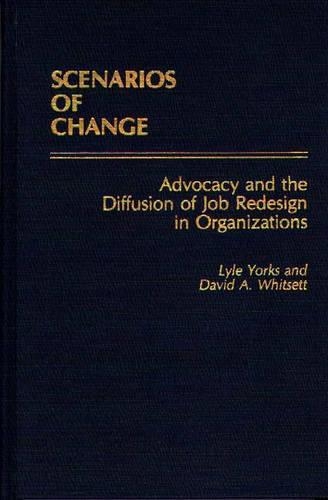
Scenarios of Change: Advocacy and the Diffusion of Job Redesign in Organizations
(Hardback)
Publishing Details
Scenarios of Change: Advocacy and the Diffusion of Job Redesign in Organizations
By (Author) David A. Whitsett
By (author) Lyle Yorks
Bloomsbury Publishing PLC
Praeger Publishers Inc
6th December 1989
United States
Classifications
Tertiary Education
Non Fiction
Organizational theory and behaviour
658.31423
Physical Properties
Hardback
240
Description
During the past two decades, many organizations have sought to utilize a number of participative management techniques in order to both motivate their workforce and to make their operations more effective in terms of costs, quality, productivity and customer service. This study examines one such technique that has gained widespread popularity: job enrichment or job redesign. Written for students and practitioners of human resource management and organizational development, the authors report on the experience with job enrichment and work restructuring in four firms and compare the experiences of two. Throughout, the authors focus on the primary challenge confronted by job redesign advocates within the individual organization: how to diffuse the relevant concepts in such a way that they have a widespread and lasting impact on the performance of the organization. Using written documentation from the four companies as well as interviews, the authors describe how each company attempted to diffuse job redesign throughout the organization and identify the lessons for management that can be learned from each case. The reasons for the success or failure of diffusion in each company are examined as are the particular steps taken by personnel within the organization. As the authors demonstrate, the successful spread of new management concepts throughout the organization requires skillful manupulation by internal advocates of the process. The most effective advocates, they argue, have detailed knowledge of the operations of an organization and use this knowledge to develop their innovations.
Reviews
This is not a book for the casual reader, but is almost certainly required reading for graduate students and faculty in management, organizational psychology, and associated fields. The material on which the book is built is not new, but the authors secured access to a wealth of historical detail on two organizations that have never been reviewed before in such depth. In addition, they integrate this new material with previously published and unpublished material on four other organizations. Their analysis leads to contrast and comparison of commonalities and differences in the diffusion of job redesign. Their findings are further summarized in the final chapter, Diffusion Requires Constructive Engagement from a Critical Mass in the Dominant Coalition of the Organization.' The book raises far more issues than it settles. The authors do not propose a solution to the diffusion of job redesign, but rather argue that it results (if it does result) from a complex and dynamic interaction of political/economic forces over an extended period. . . . Recommended for university collections.-Choice
"This is not a book for the casual reader, but is almost certainly required reading for graduate students and faculty in management, organizational psychology, and associated fields. The material on which the book is built is not new, but the authors secured access to a wealth of historical detail on two organizations that have never been reviewed before in such depth. In addition, they integrate this new material with previously published and unpublished material on four other organizations. Their analysis leads to contrast and comparison of commonalities and differences in the diffusion of job redesign. Their findings are further summarized in the final chapter, Diffusion Requires Constructive Engagement from a Critical Mass in the Dominant Coalition of the Organization.' The book raises far more issues than it settles. The authors do not propose a solution to the diffusion of job redesign, but rather argue that it results (if it does result) from a complex and dynamic interaction of political/economic forces over an extended period. . . . Recommended for university collections."-Choice
Author Bio
LYLE YORKS is Professor of Management Science at Eastern Connecticut State University. Prior to that, he served as Senior Vice President at Drake Beam Morin, an international management consulting firm. His previous books inclue From Management Theory to Business Sense (1983), co-written with David Whitsett. He also works as a consultant in the area of organizational change, and has published many articles in this field. DAVID A. WHITSETT is Professor of Psychology at the University of Northern Iowa, where he teaches industrial/organizational psychology. He previously was Vice President at Drake Beam Morin. In addition to his previous book with Lyle Yorks, he has written many articles about organizational change and job design.
